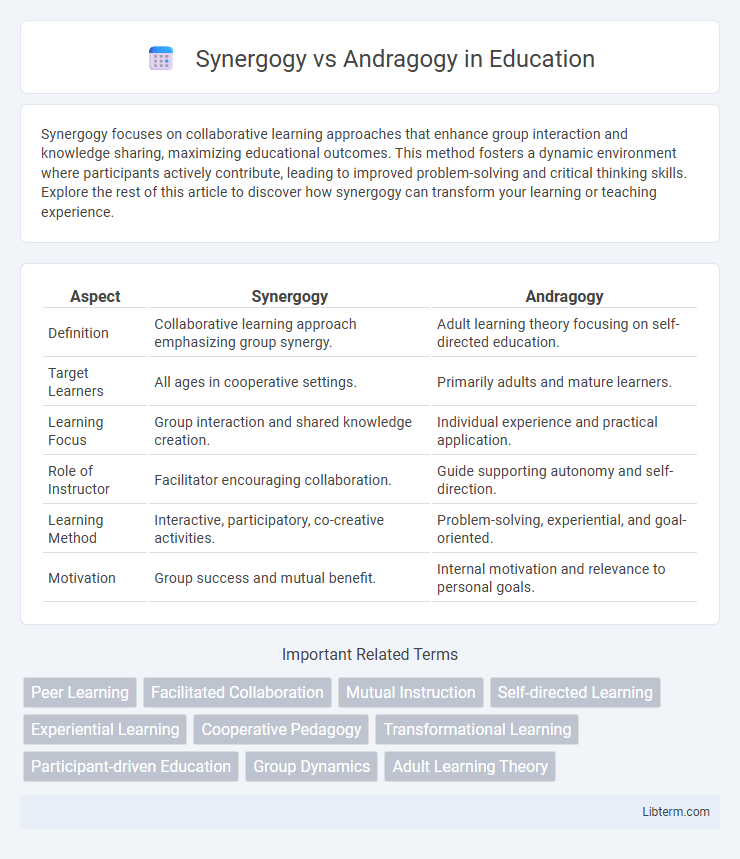Synergogy focuses on collaborative learning approaches that enhance group interaction and knowledge sharing, maximizing educational outcomes. This method fosters a dynamic environment where participants actively contribute, leading to improved problem-solving and critical thinking skills. Explore the rest of this article to discover how synergogy can transform your learning or teaching experience.
Table of Comparison
| Aspect | Synergogy | Andragogy |
|---|---|---|
| Definition | Collaborative learning approach emphasizing group synergy. | Adult learning theory focusing on self-directed education. |
| Target Learners | All ages in cooperative settings. | Primarily adults and mature learners. |
| Learning Focus | Group interaction and shared knowledge creation. | Individual experience and practical application. |
| Role of Instructor | Facilitator encouraging collaboration. | Guide supporting autonomy and self-direction. |
| Learning Method | Interactive, participatory, co-creative activities. | Problem-solving, experiential, and goal-oriented. |
| Motivation | Group success and mutual benefit. | Internal motivation and relevance to personal goals. |
Introduction to Synergogy and Andragogy
Synergogy emphasizes collaborative learning processes where learners actively engage and share knowledge, fostering a dynamic educational environment suited for adult learners. Andragogy, coined by Malcolm Knowles, centers on adult learning principles that prioritize self-direction, practical experience, and internal motivation. Understanding the distinctions between synergogy's interactive approach and andragogy's learner-centered model enhances effective adult education strategies.
Defining Key Concepts: Synergogy Explained
Synergogy refers to a collaborative learning approach where participants actively contribute knowledge and skills, creating a dynamic exchange of expertise that enhances group learning outcomes. It emphasizes collective problem-solving and the integration of diverse perspectives, making it particularly effective in professional and organizational development contexts. Unlike andragogy, which centers on adult self-directed learning principles, synergogy highlights the power of interaction and mutual engagement among learners.
Understanding Andragogy: Principles and Practices
Understanding andragogy involves recognizing adult learners' need for self-direction, practical experiences, and intrinsic motivation, distinguishing it from synergogy, which emphasizes collaborative learning and knowledge co-creation. Core principles include leveraging adults' prior experiences, fostering problem-solving skills, and encouraging a learner-centered environment. Effective practices in andragogy integrate real-world applications, promote critical thinking, and adapt to individual learning styles to enhance engagement and retention.
Historical Background: Evolution of Adult Learning Theories
Synergogy and andragogy represent distinct frameworks in the evolution of adult learning theories, with andragogy introduced by Malcolm Knowles in the 1960s emphasizing self-directed learning and experiential knowledge. Synergogy expands upon this by integrating collaborative and interactive learning processes, reflecting more recent shifts towards social constructivist approaches. These theoretical developments highlight a historical progression from individual-centered to more collective and participatory models in adult education.
Core Differences Between Synergogy and Andragogy
Synergogy emphasizes collaborative learning through peer interaction and mutual engagement, while andragogy focuses on self-directed learning tailored to adult learners' experiences and motivations. Synergogy promotes collective knowledge construction by leveraging group dynamics, whereas andragogy centers on individual autonomy and practical application of knowledge. The core difference lies in synergogy's group-based, interactive approach versus andragogy's individualized, experience-driven methodology for adult education.
Learning Environments: Collaborative vs Individual Approaches
Synergogy emphasizes collaborative learning environments where participants actively co-construct knowledge through shared experiences, promoting collective problem-solving and group interaction. In contrast, andragogy focuses on individual learning approaches tailored to adult learners' self-directed needs, encouraging autonomy and personal reflection. Both methods optimize engagement by aligning with distinct cognitive and motivational frameworks suitable for their target learner populations.
Practical Applications in Adult Education
Synergogy emphasizes collaborative learning and shared experiences that enhance problem-solving skills among adult learners, making it ideal for group projects and team-based training in corporate environments. Andragogy focuses on self-directed learning, leveraging adults' prior knowledge and intrinsic motivation, which is effective in designing individualized learning plans and workshops. Both approaches can be integrated to create dynamic adult education programs that balance autonomy with interactive engagement for improved skill acquisition.
Benefits and Challenges of Synergogy
Synergogy enhances collaborative learning by leveraging collective knowledge and diverse perspectives, fostering deeper engagement and critical thinking among participants. Its benefits include promoting creativity, adaptability, and learner autonomy, while challenges involve managing group dynamics, ensuring equitable participation, and addressing varying motivation levels. Effective implementation requires skilled facilitation to balance contributions and maintain focus on shared learning objectives.
Effectiveness of Andragogy in Modern Learning
Andragogy, centered on adult learning principles such as self-direction, practical experience, and intrinsic motivation, proves highly effective in modern educational settings by fostering engagement and retention. Unlike synergogy, which emphasizes group collaboration and collective problem-solving, andragogy's focus on learner autonomy aligns closely with current trends in personalized online learning platforms and workplace training. Research shows adult learners achieve better outcomes when instructional methods incorporate real-world applications and encourage critical thinking, validating andragogy's pivotal role in contemporary adult education.
Choosing the Right Approach: Factors to Consider
Choosing between synergogy and andragogy depends on learner engagement levels, group collaboration needs, and the complexity of the subject matter. Synergogy emphasizes collaborative learning and peer interaction, ideal for environments requiring co-creation of knowledge, while andragogy focuses on self-directed learning suited for adult learners with prior experience. Factors such as learner autonomy, motivation, and the desired learning outcomes guide the selection of the most effective educational approach.
Synergogy Infographic

 libterm.com
libterm.com